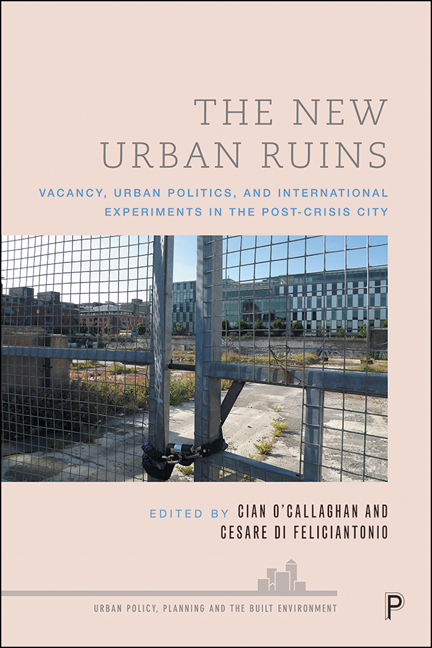Book contents
- Frontmatter
- Contents
- List of figures and tables
- Notes on contributors
- Acknowledgements
- Introduction
- PART I Rethinking ruination in the post-crisis context
- PART II The political economy of urban vacant space
- PART III Reappropriating urban vacant spaces
- Conclusion: Centring vacancy – towards a research agenda
- Index
12 - (Im)Material infrastructures and the reproduction of alternative social projects in urban vacant spaces
Published online by Cambridge University Press: 13 May 2022
- Frontmatter
- Contents
- List of figures and tables
- Notes on contributors
- Acknowledgements
- Introduction
- PART I Rethinking ruination in the post-crisis context
- PART II The political economy of urban vacant space
- PART III Reappropriating urban vacant spaces
- Conclusion: Centring vacancy – towards a research agenda
- Index
Summary
Introduction
The city is still empty, few days since the eviction of Communia…. Many people involved in the project have come back to the city from their holidays, from their family homes, several meetings are being organised. People from the neighbourhood, other squats and groups are all giving their support towards a new occupation … the new location has been identified thanks to the deep knowledge of residents, the plan … to have a demonstration ending with the occupation of the building in the upcoming days…. I spoke to [name of person] about what is going on, we were both amazed by the response of so many people at such time. ‘We can do it, we are determined and organised’ [name of person] told me smiling at the end of our chat. (Cesare's research diary, August 2013)
These diary notes concern the response of militants and neighbourhood residents to the eviction of Communia, a squatting initiative that emerged in the San Lorenzo neighbourhood in Rome in April 2013, by the police in mid-August, a time when most Italian cities get very quiet, people go away for summer holidays and political activism is usually on pause. Summer is often the preferred time for police to carry out evictions in order to avoid clashes. However, in recent years, several Italian squatting initiatives evicted during summer months have seen a strong response from activists and residents. The most dramatic occurred in central Rome in August 2017, when hundreds of squatters – mostly refugees – were violently evicted without a clear or coherent plan for their rehousing (Annunziata, 2020). Squatting is just one example of the alternative social projects over vacant spaces in post-crisis cities. In a previous article (O’Callaghan et al, 2018), we have drawn on the work of Povinelli (2011) to frame alternative social projects as all those experimenting with alternative human and post-human relations. In that article, and here, we emphasise the important role that urban vacant spaces have played in the experimental formation of alternative social projects. Urban vacant spaces can stand in contradistinction to the normative vision of neoliberal capitalist space (Doron, 2000; O’Callaghan, 2018), and are characterised by radical openness to prefigurative experiments producing alternative urban futures (Bresnihan and Byrne, 2015).
- Type
- Chapter
- Information
- The New Urban RuinsVacancy, Urban Politics, and International Experiments in the Post-Crisis City, pp. 211 - 228Publisher: Bristol University PressPrint publication year: 2021



